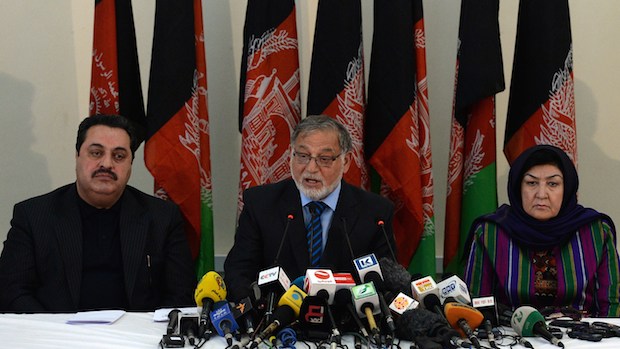
Head of the Afghan Independent Election Commission Ahmad Yousuf Nuristani (C) speaks during a press conference in Kabul on May 15, 2014. (AFP PHOTO/WAKIL KOHSAR)
Kabul, AP—Afghan voters will return to the polls next month to choose a successor to outgoing President Hamid Karzai, whose refusal to sign a deal permitting US troops to stay beyond the end of the year has raised security concerns as the Taliban press their deadly campaign of bombings and attacks.
The second round of voting was announced on Thursday in Kabul and the balloting was set for June 14. It will likely feature a tight race between two top vote-getters from the first round, former Foreign Minister Abdullah Abdullah and ex-Finance Minister Ashraf Ghani Ahmadzai.
But it is also cause for concern since the second round will coincide with the height of the Taliban spring offensive that was launched earlier this week. The insurgency has renewed its campaign of attacks on the Afghan police and military—increasing fears over security when voters head to the polls.
The Taliban have pledged to disrupt the vote with bombings and other attacks, although the first round on April 5 passed relatively free of violence.
Abdullah garnered 45 percent of votes in the first round while Ahmadzai came in second with 31.6 percent, Independent Election Commission Chairman Ahmad Yousuf Nouristani said.
The final results announced by Nouristani were almost exactly the same as the preliminary results released late last month.
Over 7 million Afghans voted in the first round, considered a strong turnout in an election plagued by Taliban threats and logistical hardships for both voters and poll workers.
The head of the United Nations mission in Afghanistan commended the candidates for running “a hard-fought but positive campaign.”
“I hope that the prevailing respectful tone seen in the first round is preserved in the weeks ahead,” said Jan Kubis, the UN secretary general’s special representative for
Afghanistan. “Candidates have a responsibility to call on their supporters to refrain from inflammatory rhetoric, intimidation, and threats.”
James Dobbins, the US special representative for Afghanistan and Pakistan, said there’s a risk that the cordial tone between candidates in the first round could sharpen in the second round.
“The quality of the first-round campaign was good, the candidates were moderate and positive, treated each other courteously and didn’t appeal to ethnic, religious or sectarian issues,” Dobbins said Tuesday in Tokyo, where he was taking part in a meeting of the International Contact Group on Afghanistan and Pakistan.
“The second round could become a little more negative potentially, it could be more potentially divisive,” Dobbins said. “I’m not predicting this, but it’s something that one worries about a bit.”
Earlier this week, Abdullah picked up a potential election-tipping endorsement in Zalmai Rassoul, an ex-foreign minister who took 11.5 percent in the first round.
But it’s unclear whether Rassoul can deliver the votes of his supporters, who are largely Pashtuns, the country’s largest ethnic group.
International attention is also focused on whether the new president will sign a deal already negotiated by outgoing President Hamid Karzai to allow some US forces to stay in Afghanistan after the end of the year.
Both Abdullah and Ahmadzai have said they support the deal.
